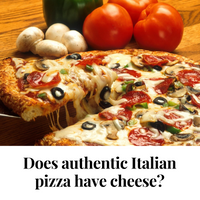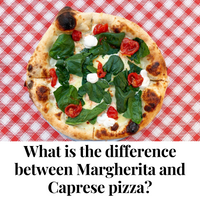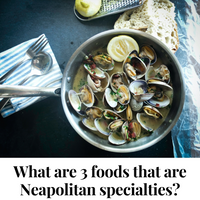
You're not alone if you've ever wondered how long vacuum-sealed tomato sauce will last. The same question asks many consumers, wondering how long this sauce can last in the fridge.
If you want delicious vacuum sealed pizza that brings authentic Neapolitan flavors to your table, order frozen Margherita pizza now!
After all, the use-by date on a jar isn't necessarily accurate. It depends on the type of tomato sauce you've purchased. Generally, it's good to consume tomato sauce within three to five days of opening. But, if you freeze them, they can even last up to a year.
Luckily, there's an easy solution: you can vacuum-seal your tomatoes in advance. And there are a bunch of other ways to store your tomatoes. To know more about how long vacuum-sealed tomato sauce lasts and a lot more, keep reading on!
How Long Does Vacuum Sealed Tomato Sauce Last?
Vacuum sealed tomato sauce lasts anywhere from about 6 months to 12 months. To store tomato sauce by vacuuming, you can use FoodSaver bags that are available online. While they're expensive, they're worth the investment.
Vacuum-sealed tomato sauce will retain its taste for up to 3 years in a cool, dry place. It can even last 2-3 years in a freezer, thanks to its low surface area. If you’re wondering whether you can use ketchup on pizza, click here.
If you purchase canned tomato sauce, once you've opened the can, it's time to store it properly. Unopened cans of tomato sauce should stay in the fridge for two to three days, but it's best to use them up before they expire. If the lids are bulging, rusting, or dingy, you're better off dumping them.
Once the can is clean and dry, vacuum sealing it will protect the sauce from oxygen. If you're using a vacuum sealer, make sure the bag has a vacuum-sealing device. Using a vacuum-sealing device can help extend the life of your tomatoes.
Can Tomato Sauce Be Vacuum-Sealed?
Can tomato sauce be vacuum sealed? Yes, it can! Using a FoodSaver vacuum-sealing bag is a great way to preserve this summer treat. The tomato sauce should be frozen before vacuum sealing, so it remains in solid form.
A few minutes in the freezer can also help preserve its taste. Regardless of how you store it, tomato sauce will last at least two years if stored properly. And if you don't use the FoodSaver bag right away, it may suffer freezer burn.
When vacuum-sealing tomato sauce, it is important to use a food-safe plastic bag to prevent oxygen from entering the product. Most sealing bags are made of Mylar, a thicker plastic material. If you’re in the mood for four cheese pizza, click here to order!
You can use Mylar bags if you want a vacuum-sealing bag for your tomato sauce. Alternatively, you can use freezer bags. If you don't have a FoodSaver bag, you can use a regular plastic bag.
Once sliced and peeled, tomatoes can be stored in a gallon freezer bag. You should store them on a single layer to save space. After freezing, rinse them under water for a couple of minutes to remove any remaining skins.
Once they are thawed, you can use them in your favorite recipe. However, remember that the taste and texture will not be the same as fresh tomatoes. A good option is to use canned or frozen tomato sauce.
If your tomato sauce has been opened, make sure you keep it refrigerated. Once opened, it should last at least three days in the refrigerator or two to five days in the freezer. If it has not reached its best quality, discard it.
However, if it has become rusty or bulging, it is best to discard it. Once thawed, a sealed container will prevent spoilage and prevent contaminants from contaminating the tomato sauce.
Will Vacuum Sealing Vegetables Make Them Last Longer?
If you're wondering if vacuum-sealing your vegetables will help them last longer, you're not alone. There are a few different methods of vacuum sealing that you can use. Read on to find out how to vacuum seal vegetables for the longest storage life possible.
If you're wondering if vacuum-sealing your veggies will make them last longer, there are several benefits to this method. Using a vacuum sealer will ensure the food will remain fresh for up to six months, which is significantly longer than conventional methods.
Vacuum sealing can help you save on your grocery bill. Once you stock up on fresh vegetables, you'll have no more excuses to eat fast food again. And the food you cook is healthier and lower in fat content than takeout.
First, wash and dry all your produce thoroughly. Next, if your product is large, make sure it's cored and cut into smaller pieces. Remember to drain it thoroughly before vacuum-sealing it. Also, pre-freezing will help protect soft fruits from crushing while being vacuum-sealed.
While vacuum-sealing does extend the shelf life of fresh produce, it doesn't always extend the eating season. While warm-weather crops will only last until the first frost, you can also freeze vegetables to extend their lives.
For example, ripe red tomatoes can be frozen and made into marinara sauce for later use. For more convenient storage, you can also use a freezer-sealing machine.
How to Vacuum Seal Pizza
You might be wondering how to vacuum seal pizza. The good news is that you can use the same techniques to wrap a pizza in aluminum foil or saran wrap.
You can also vacuum seal the pizza in a freezer-safe bag and store it for up to four to eight months. The benefits of using a vacuum sealer are many. Using a vacuum sealer will protect your food from freezer burn and extend its shelf life by three to five times.
Here's a low to prepare your pizza before vacuum sealing:
- Before vacuum-sealing a pizza, you need to remove the pizza from its box. '
- Next, wrap the pizza slice in cling wrap two times, with the shiny side of the foil facing the cling wrap.
- After that, wrap the pizza slice in aluminum foil, which will bond to it better. When the pizza is ready, remove it from the box and put it in the freezer.
- Start vacuuming your pizza using your vacuum machine.
Once the pizza has been vacuum sealed, you can thaw it. Place the frozen pizza on an aluminum foil-lined baking sheet. This way, it won't lose its flavor and will stay fresh for up to three months.
This is also a great way to make extra pizza when you're short on time. If you're concerned about the pizza losing its flavor, you can place it in a freezer bag before vacuum-sealing it.
If you don't own a vacuum sealer, you can still vacuum seal your pizzas if you have a freezer-safe bag and an air-tight zipper. If you’re craving authentic Neapolitan pizza, find out how Pizza Bien delivers authenticity to your door!
A vacuum sealer bag is thicker than an average freezer bag. A vacuum sealer can hold a 14" x 16" pizza. It also compresses the plastic space by using aluminum foil. This will prevent dehydration and freezer burn while preventing the formation of ice crystals on the pizza surface.
If you're looking for a great vacuum sealer, look no further than AMAC Technologies. The company sells high-quality vacuum sealer equipment and other products for packaging food items.
With its low-priced packaging equipment, this method is perfect for any kitchen. And pizzas can be stored in boxes that have been vacuum-sealed. There's nothing more delicious than eating a pizza that's been perfectly preserved!
How To Extend Shelf Life of Tomato Sauce

When preparing tomatoes for vacuum sealing, it's important to wash them thoroughly and remove soft spots or bruises. You can use a paring knife to cut out any soft spots or bruises. Be sure to remove the stems if you use them, as they'll easily pop off when thawed.
After that, place the tomatoes in a freezer bag and vacuum-seal them. To avoid a leak, make sure to remove any excess air before sealing.
Another way to extend the life of canned food is by vacuum-sealing. A vacuum-sealed container will help preserve the ingredients for three to four months. You can even vacuum-seal vegetables such as broccoli and green beans.
These vegetables tend to have a shorter shelf-life, so make sure to chop them before vacuum-sealing. Once you've done that, the vacuum-sealing bag will keep them fresh for weeks, months, or years.
Other types of foods can be vacuum-sealed. Pasta sauce can be vacuum-sealed after being par-frozen, and fruit can be sliced and vacuum-sealed in individual portions. You can also vacuum-seal silverware to prevent tarnishing.
Be careful when vacuum-sealing with sharp objects, such as forks and knives. The sharp edges of silverware may puncture a vacuum bag.
Final Word
Pizza can be stored in a freezer for up to four months. The temperature should be below forty degrees Fahrenheit to make sure that it's frozen. When the temperature is below 40 degrees, it also helps protect the food from microbial growth.
The food will stay fresh longer if you vacuum seals it. Besides preserving the toppings, vacuum packing is also good for preventing food waste. The pizza pie and tomato sauce will last longer in the freezer, making it a valuable investment for any pizzeria. Hence, till the next time, happy feasting and stay safe!
Our real Italian pizzas from Italy are handmade with all-natural of high quality and fresh ingredients in Naples, Italy delivered to you, anywhere in the U.S. Free Shipping Nationwide. Buy here now!









0 comments